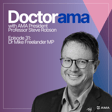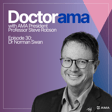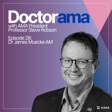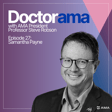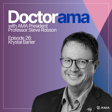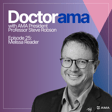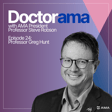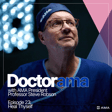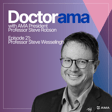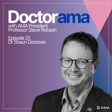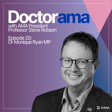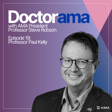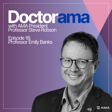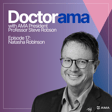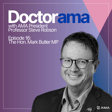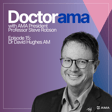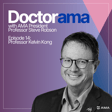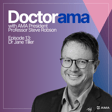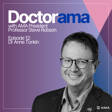Become a Creator today!Start creating today - Share your story with the world!
Start for free
00:00:00
00:00:01

Episode 6 - Dr Sandro Demaio
In episode 6 of Doctorama AMA President Professor Steve Robson chats with Dr Sandro Demaio.
Recommended
Transcript
Chronic Disease and Obesity in Australia
00:00:00
Speaker
In Australia at the moment, one in two of every Australians is dealing and living with a chronic disease. In fact, one in five of us have more than one chronic disease. We have some of the highest levels of obesity in the OECD.
Rise in Vaping and Smoking Among Young Australians
00:00:15
Speaker
And on top of all that, at the moment, we're seeing a new generation of Australians taking up vaping and we're seeing levels of smoking in young Australians going up for the first time in a generation.
Introduction of Global Health Expert Dr. Sandro de Mayo
00:00:27
Speaker
It would be very easy
00:00:29
Speaker
to think we've missed the boat. This is all too hard. We can't deal with it. But luckily in Australia, we have someone who's worked with the World Health Organization, elite institutions in North America and Europe, and has brought that expertise back to Australia where he grew up. We're going to hear from my guest today. Does he think we've missed the boat on Dr. Rama?
00:00:55
Speaker
You're listening to Dr. Rama with Steve Robson, bringing you the best of health, medicine and people. My guest today will be known to many, many Australians. It's Dr. Sandro de Mayo. Welcome to Dr. Rama, Sandro. G'day, g'day. Thank you so much for joining us today. You are a Melbourne boy originally.
Dr. Sandro's Global Experience and Shift to Public Health
00:01:17
Speaker
I am, yeah. You've worked around the world. What led you to go overseas and work over there?
00:01:23
Speaker
Well, I was so I trained and worked as a medical doctor at the Alfred Hospital. I went through Monash, always fascinated by health and the human body and was lucky enough to volunteer for many years with St John Ambulance. And so medicine was a natural pathway for me in many ways. But as I started to work as a doctor, I began to see a common theme across remote communities,
00:01:52
Speaker
major urban hospitals in Sri Lanka after the Boxing Day tsunami where I did over a month of humanitarian aid work and in some work that I did as part of my Masters of Public Health in Cambodia. And the common element in all of these countries and settings and communities was that most of my patients were dying or experiencing really significant
00:02:19
Speaker
pain and suffering from a group of diseases that we knew how to prevent. That 90% of patients in Australia die from diseases that we know how to significantly delay or prevent.
00:02:35
Speaker
that number is similar in many countries. And what really shook me in some ways was also that these are not diseases of affluence. In fact, they're diseases deeply linked with poverty, inequity and structural discrimination.
00:02:51
Speaker
So I decided instead of continuing to patch people up at the bottom of the proverbial cliff, I would try and climb to the top of the cliff and build a fence. And that's what public health is. So initially I left after I'd finished my MPH and done just a year and a half as a medical doctor.
Health Policy Differences in Denmark and Mongolia
00:03:09
Speaker
I left Australia and did what was going to be in the first instance, just a year overseas in Denmark.
00:03:17
Speaker
And I had the most amazing experience living in Denmark, a country with a similar GDP to Australia, but an obesity rate half to a third. A country that is so far ahead of the world and a region that's so far ahead of the world in many areas of health policy. And this really impressed on the opportunity and the fact that it's not too late and that there's a lot that we can do with the wealth and expertise and opportunity we have here in Australia.
00:03:45
Speaker
That one year became three as I fell into a fabulous opportunity to do my PhD and run a national survey funded by the US government in Mongolia. So I was suddenly collecting data across three and a half thousand households on chronic disease in Mongolia. I was there when the first fast food outlet opened.
00:04:04
Speaker
literally watched as their country urbanized and as hunger reduced and chronic disease increased and worked really closely with the WHO and the Ministry of Health and others to design and implement health policy as I lived back and forth between Mongolia and Denmark.
Dr. Sandro's Social Startup and Global Health Contributions
00:04:23
Speaker
I then launched a social startup because I wanted to try and bring young people from around the world from all different sectors together in particularly emerging market major cities. So the idea was bringing sort of non-health leaders together around wicked health challenges and chronic disease in emerging markets early in their career, create networks, multidisciplinary networks.
00:04:48
Speaker
and give them the skills of policy advocacy and communications to be able to break the ceilings that many of them were facing in getting their issues across the line. That took me to Harvard for two years, and then to the WHO headquarters in Geneva for three years.
00:05:08
Speaker
And finally, after three years of being a diplomat, I realized I'm not very diplomatic, or at least I wasn't at the time. And I was pretty impatient and had a fabulous, you know, fabulous time with the UN, really privileged to work for an amazing boss in the nutrition and chronic disease team, led a Lancet series, designed, helped to design the United Nations Decade of Action on Nutrition, and then ended up
00:05:34
Speaker
Going back to my roots in the startup world and running a global foundation focused on food systems transformation out of Northern Europe, again launched another Lancet Commission. And finally, due to love and also some sickness in my family, everyone's well now, but it was a bit hairy for a moment.
00:05:53
Speaker
I made the return back to Australia and here I've been for four years running VicHealth.
Leading VicHealth and WHO's Role in Global Health
00:05:59
Speaker
Sandra, that's an extraordinary story and it I think will tell our listeners just what an extraordinary background and experience you have. Before I move on, you've worked with the World Health Organization. I'm a big fan.
00:06:12
Speaker
But we hear critics around the world and calls to defund them or whatever. Can you tell me a little bit about your experience of working with them and why you think the World Health Organization is so important? Look, so really to understand why it's important, you need to understand a bit more about the WHO. And there are a lot of misconceptions. So the World Health Organization is a technical agency. It's an agency that really guides
00:06:40
Speaker
you know, the scientific and normative areas of medicine and health worldwide. So what does that mean? It means they produce guidelines. It means that they often bring together consensus knowledge and expertise to inform policies and to advise governments.
00:06:59
Speaker
And they largely, you know, really largely they're a knowledge agency. And this is quite different from some other agencies that often they work alongside, like UNICEF or the World Food Programme or, you know, other development agencies that are actually implementing agencies. So they have much bigger budgets, much bigger teams, they're on the ground.
00:07:24
Speaker
doing more of the implementation work. WHO's role is really actually one of technical excellence and guidance. It's about building the knowledge, providing the understanding and enabling better decisions, better investments and better outcomes. And they do that for across three areas, health emergencies, health systems and healthier populations.
00:07:51
Speaker
The other thing that's important to understand is its governance. So the World Health Organization is actually governed by the health ministers of the world through the World Health Assembly. So in some ways, this is, you know, in many ways, this is a really amazing piece, an important piece of governance, because it means that every country has one vote and that it's a very democratic, democratically run organization.
00:08:18
Speaker
not without its problems like any organization, but certainly incredible strengths. The downside, though, is that, of course, consensus takes time. And so, as with most large organizations and particularly international organizations,
00:08:35
Speaker
Things can take time because they don't want to get them wrong and also they need to have the consensus of many countries that have different priorities. So the process of getting consensus across countries in a globalised and dynamic world as well as the outcomes are both really important.
00:08:54
Speaker
And I strongly believe when you look at the idea that the WHO, and it's 6,000 staff, which sounds like a lot, but they're responsible for the health of...
00:09:06
Speaker
seven billion people, they do extraordinary work and they're in more than 100 countries around the world and they're often the kind of the silent contributors in the background that maybe don't get as much air time and don't have the
00:09:29
Speaker
They're not the implementation agencies, so they're not always as visible, but certainly make a really, really important contribution. And I think we saw that first and foremost through the last few years and the difficult
00:09:47
Speaker
challenging environment that COVID presented, which was a mix of that kind of politics, health is inherently political policy, and of course, expert guidance, which comes with uncertainty, as all science does. Yeah,
VicHealth's Impact and Global Influence
00:10:04
Speaker
absolutely, Sandra. So you put all of this expertise
00:10:07
Speaker
to an organisation called VicHealth and a lot of people in other states of Australia won't understand VicHealth and its role. I wonder if you could give us a brief description of what it does and what its role is in Victoria's lives.
00:10:20
Speaker
Yeah, thanks very much. I mean, I often kind of say and truly believe I think I have the best, I think we actually, we might have even said it to each other, Steve, at one point, I think I have the best job in public health in Australia. And I think you said the same. And we just had to agree to disagree. But I mean, VicHealth is a truly remarkable organization. And I can say that because I had no involvement in its establishment. I was just a few years old, in fact, when it was established.
00:10:47
Speaker
So it was established in 1987 through the tobacco act and overnight in those days, you know, these are the days where you could smoke on airplanes, you could light up a cigarette in a cafe or a restaurant or a theater or pretty much anywhere you wanted. And overnight, tobacco advertising was banned across all of our art, sports, social, cultural events.
00:11:10
Speaker
Of course, Big Tobacco was a big sponsor of many of these. They were on the chests of our footballers. They're on the cars of our Formula One Grand Prix teams. To help those events and organisations and sporting teams transition to a tobacco-free advertising world,
00:11:30
Speaker
The government at the time decided to establish an independent statutory authority, actually a foundation, because our full name is the Victorian Health Promotion Foundation.
00:11:44
Speaker
So they taxed tobacco, took a small amount of that taxation and what we call hypothecated it or earmarked it, said it has to go to this independent agency. The agency has three members of parliament. We have three members of parliament on our board, one from Labor, one from Liberal, one from the Crossbench. So it's a truly tri-partisan, non-partisan organization. We have lived experience and sector experts that make up the rest of our 14 person board.
00:12:12
Speaker
And there's a piece of legislation that protects the organisation, its funding and its work. And so what it means is that then for the last, well, over 35 years,
00:12:27
Speaker
VicHealth's been able to really systematically invest in a pipeline of world-class research and research institutions such that we have an incredible richness of public health research and researchers here in Victoria and Southeast Australia that VicHealth has been really critical in establishing.
00:12:47
Speaker
We've been able to bring and help some really critical and important innovations like SunSmart and Quit and BreastScreen all come to Victoria and all grow and achieve scale and eventually be spun out as sustainable programs across Victoria.
00:13:04
Speaker
And we've also been able to work really closely with government on a range of critical health issues, including most recently on the harms around e-cigarettes. But over the last 35 years, there have been a number of critical health and policy issues that we've been able to support government on.
00:13:25
Speaker
So we're quite a small agency. I always say, you know, we're run like a business. We have a culture like an NGO, but we are part. We're proudly part of government. I work for the people of Victoria, but I am appointed by the health minister. I report into a board and I have about 100 staff. So we're not very big. But, you know, to have that that that funding,
00:13:45
Speaker
protected by legislation that allows us to work on the long-term difficult structural drivers of poorer health outcomes at the primary prevention end is a truly, I think, brilliant piece of policy infrastructure and innovative financing that even today, as we speak, other states are using as a blueprint for their own agencies
00:14:14
Speaker
And since we're established, about 30 organisations around the world, including Tonga Health and Thai Health, the Singapore Health Promotion Board, Swiss Health, were all actually modelled on us. We were the world's first health promotion agency. And I'm really proud of that as an important contribution to health policy and health policy governance for prevention globally.
Public Health Challenges and Future Optimism
00:14:39
Speaker
Yeah, Sandra, you have a very, very, very big remit.
00:14:43
Speaker
I'm going to bring us back to where I started. We seem to be facing an overwhelming number of public health challenges that look daunting. Do you think it's too late and
00:14:54
Speaker
Have you got anything really, I guess, to say to Australia's doctors about prevention? Well, look, I mean, I think it's the Chinese adage of the best time to plant a tree is 10 years ago and the second best time is now. Maybe when it comes to prevention, I'd say 30 to 40 years ago, because that's the timeline over which we've seen a really rapid increase, a global dominance of chronic disease.
00:15:23
Speaker
But I think we have to remember that that's largely happened in a single generation.
00:15:30
Speaker
tens of millions of years, life expectancies for humans as a species have got longer. In many countries, children today are the first generation in history ever to likely live a shorter life expectancy than their parents because of the increase in chronic disease, the globalization and commodification
00:15:55
Speaker
of our food systems and the commercialization and the influence of the commercial world, both for good and for bad on many aspects of our health and how they play out in the social determinants.
00:16:10
Speaker
The flip side of that, of course, though, is that if it's all happened in 30 years, it can absolutely be undone in 30 years. We've seen that with tobacco. While there are more smokers on the planet today globally, we have to remember that the war on tobacco is not over and the tobacco industry is just finding new products and new ways to profit largely in developing countries.
00:16:33
Speaker
Thanks to the really strong leadership here in Australia, world leading leadership of people like Mark Butler, but also Nicola Roxanne and others, we have been able to wind back the clock on the devastating impact and harms of tobacco and cigarettes to achieve one of the lowest rates of smoking in the world.
00:16:56
Speaker
That didn't happen accidentally. And I can tell you, I reckon there would have been lots of people like Mike Dorp and Simon Chapman and others who probably would have been sitting in the 80s and 90s and Nigel Gray and would have said, gosh, is it possible to turn back the clock on something that was so normalized? I mean, we smoked on aeroplanes. It was crazy. And it's crazy now to think that only 20 years later, we think it's crazy. So for me,
00:17:25
Speaker
There are actually really great examples of public health challenges that had been completely ingrained and could have easily been seen as unsolvable that we have managed to solve here in Australia. I think the other part that gives me a lot of confidence is that other countries are doing
00:17:48
Speaker
incredible things in other areas of health policy. You look at Chile and what they've done in food labeling and food pricing, Mexico with their sugar tax. You look at the UK with their ban on advertising on public transport and all of these now have proof that they're making a difference in public health and that they're supported by the public and politicians largely are really proud of those innovations.
00:18:12
Speaker
So we can learn from others. We've got to track history. And I think the third thing that gives me confidence is the incredible
00:18:21
Speaker
solidarity and also maturity of the public health community here in Australia. We are very lucky to have a world-class community, institutions, individuals, leaders in government, but also in non-government organisations. And Steve, I've absolutely put you in that group as well. I mean, I think having these strong voices across the nation that are ready and rearing to support
00:18:52
Speaker
visionary and bold leadership from and with Australian communities, but also with our politicians. I think actually it's a really exciting time in Australian public health policy. I think some very exciting things, some very important and maybe even some world first things are going to happen in this country over the next five years. And I'm really excited to play a small part and to be able to support that.
Conclusion and Future Discussion on Nutrition
00:19:16
Speaker
Sandro, I've only really scratched the surface of what I want to talk to you about today. I want to thank you for talking to Dr. Rama. I'm hoping I can pin you down to talk to me again soon. With a name like Sandro de Mayo, I get a sense food is very, very important to you from an Italian background. So I hope we can connect again and talk about the way that we nourish ourselves across our lives. But thank you so much for joining me on Dr. Rama today.
00:19:44
Speaker
I'd love to come back and maybe we can even do it over a meal. That sounds fantastic. All the best, Cedro. And thank you. Thank you. You've been listening to Dr Rama, a podcast produced on Ngunnawal Country by the Australian Medical Association. All rights reserved.
